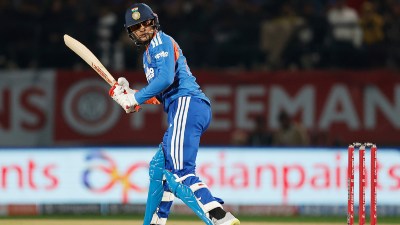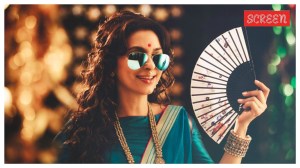Magic Numbers
WHEN Sagarika Music launched its new album Dilse Maratha Hai ahead of the Lok Sabha elections, the low-key music firm was suddenly in the sp...

WHEN Sagarika Music launched its new album Dilse Maratha Hai ahead of the Lok Sabha elections, the low-key music firm was suddenly in the spotlight.
Not because stars like Urmila Matondkar and Vivek Oberoi featured in its music video Jai Jai Maharashtra. Congressmen couldn’t swallow composer Avadhoot Gupte’s tinkering with state anthem Majha Maharashtra. They were appaled at the Bambaiya swear word chyamayla Gupte had introduced in his version.
‘‘We just added a few lines to make it peppy. Congress workers cried hoarse because it was launched by Shiv Sena leader Uddhav Thackeray at his residence, Matoshri (in Bandra, Mumbai),’’ says the 28-year-old. During the last six years, his albums have included Dilse Maratha Hai, Aika Dajiba and Meri Madhubala—all for the 20-year-old production house (previously called Sagarika Acoustronics).
‘‘We believe in creating quality music, not in churning out rubbish,’’ says Sagarika Bam, the company’s 33-year-old president at Geet Studio in the Mumbai suburb of Andheri.
The rented office is squeezed above the Ravindra Natya Mandir in Prabhadevi but, six years after its Marathi-Hindi division came up in 1998, things look good.
Sagarika’s debut album Aika Dajiba (Hello Brother, 2002) was a spectacular success (it sold 4 lakh copies) and made singer Vaishali Samant a household name, while Meri Madhubala (2003) burnt the charts with a record 5.5 lakh copies. Dilse Maratha Hai is said to be doing “extremely well’’, thanks also to the controversy. Compare that with two-year-old Music Curry’s figures of 2 lakh copies for its debut album Band of Boys and you’ll get the idea.
After all, there are no starry ties here—save the posters of Oberoi and Matondkar. ‘‘The likes of Vivek and Urmila don’t call up often, but they are always talked about here,’’ says manager Sameer Dixit.
Sagarika is now set to shift its offices to a 2,000 sq ft space in Wadala with its own recording studio. Beginning with 500 cassettes a day six years ago, the company’s two factories in Vashi and Chembur today produce 1.2 lakh cassettes and 40,000 CDs daily—a mix of Bengali, Marathi, Hindi and Indi-pop albums.
|
THE RISING
|
|||
| • Aika Dajiba (2002) sold 4 lakh copies • Pretty Lady Mix (March 2003) features the famous Sajna Hai Mujhe Sajna Ke Liye, with model Neha. • Meri Madhubala (October 2003). The songs, including the title track Tujhe Dekh Ke Meri Madhubala, were mostly rendered by Gupte. Sold 5.5 lakh copies. • Safar (February, 2004), rendered by Babul Supriyo, has eight Kishore Kumar hits, including the evergreen Musafir Hoon Yaaron. |
|||
Its remixed titles like Safar, Dilbar Dilse (starring actor Bhumika Puri), Sajna Hai Mujhe Gaana (with Mallika Sherawat) and Jadoo Mix have upped its cool quotient, while balancing it out are classical titles with veterans like Ustad Bismillah Khan, Pandit Bhimsen Joshi and Pandit Jasraj.
It’s a regular potpourri and Bam loves to experiment. For Safar, a remix of Kishore Kumar hits, she asked Babul Supriyo to add a contemporary feel. The result was commentaries a la Amitabh Bachchan in Silsila between songs. Says Supriyo, ‘‘Many big companies are struggling because they don’t innovate. Sagarika allows you the freedom to experiment.’’
A quest that has led Bam to set up a kids’ wing, too. The Culture Company produces audio books, puzzles and animation films. It may not match the work of the big daddy, Ram Mohan, but it has mothered mythologicals like Krishna and Sudama and Bhim and Bakasura.
Awaiting release is a new album with Samant, a devotional album with Anoop Jalota and a few Indi-pop and classical albums. ‘‘When I was nowhere, Sagarika gave me a break (with Aika Dajiba),’’ says Samant. “I will work with it even when I am a big star.’’
- 01
- 02
- 03
- 04
- 05































